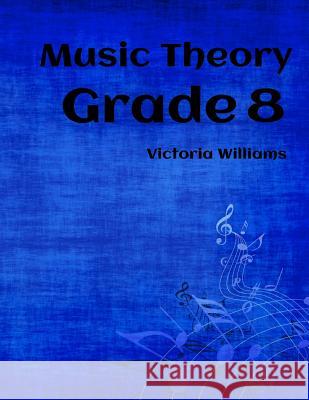Grade Eight Music Theory: for ABRSM Candidates » książka
Grade Eight Music Theory: for ABRSM Candidates
ISBN-13: 9781530907380 / Angielski / Miękka / 2016 / 92 str.
By Victoria Williams BA Hons, AmusTCL Grade Eight Music Theory for ABRSM Candidates A complete course for students taking the ABRSM Grade 8 music theory exam. This book takes you through each topic with a step-by-step approach. The topic in each unit is explained in simple terms with several musical examples, and is then followed by a page of consolidation exercises so that you can immediately practice your new-found knowledge. Model answers are provided. The course covers the ABRSM syllabus for Grade Eight, which is an advanced level. The course is broken down into four sections, which mirror the way the exam paper is organised - The Trio Sonata, Keyboard Reconstruction, Composition and Score-based Analysis Questions.
Question 1 in the ABRSM grade 8 music theory exam requires you to "fill in the gaps" in a Baroque Trio Sonata. In this section of the course, you will learn exactly what a Trio Sonata is, and how it is constructed, before having a go at building one yourself, step-by-step. You will learn how to cope with common stumbling blocks, such as minor keys, modulation and suspensions, as well as mastering the art of applying sensitive melodic decoration, added 7th and 9th chords and their idiosyncracies. You will also learn how to identify sections where sequences imitation or repetitive motifs are expected. A method for approaching the question in a systematic way is provided. In the keyboard reconstruction question, you are given a handful of bars from a piano piece written in the Romantic era, and will need to supply the missing bars. This section of the course explains exactly how to do that, as well as highlighting some common pitfalls. You'll also learn how to adhere to the Romantic style, and how your knowledge of the "rules of harmony" will help you answer this question in a more effective way. The third section of the course covers composition. You will find out exactly what the examiner is expecting of you, in order to gain top marks for your composition. At this level, the examiner is expecting you to write something which is reasonably sophisticated, which means making use of a variety of recognised techniques. You will learn how to structure your piece into phrases with cadences, how to plan and execute modulations, how to adapt melodic ideas with sequences, imitation and rhythmic motifs and how to write "idiomatically" for the instrument in question. The last section of the course is general knowledge - you will learn how to answer a range of questions based on a score for either an chamber work, or an orchestral piece. You'll learn about how ensemble scores are organised, which instruments transpose and how, as well as a myriad of other skills such as intervals, writing out ornaments, or analysing harmony. Similar to the requirements at grade 7, the grade 8 paper generally expects your knowledge and interpretive skills to be wider, more descriptive, and more accurate at this grade. Perfect for self-study, or to use with your music teacher. Ample musical illustrations and exercises are included, with model answers provided. Each page has been carefully designed to be suitable for photocopying. This book is "bilingual," and contains both UK and USA musical terminology.
Zawartość książki może nie spełniać oczekiwań – reklamacje nie obejmują treści, która mogła nie być redakcyjnie ani merytorycznie opracowana.











